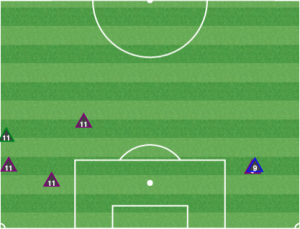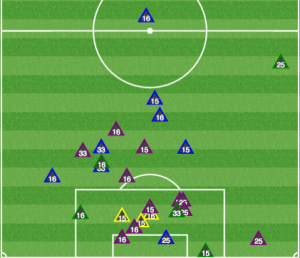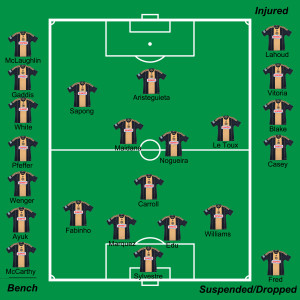Photo: Earl Gardner
Who: Philadelphia Union at DC United
What: 2015 regular season game
Where: RFK Stadium
When: Saturday, May 30 at 7 pm
Watch: TCN, MLS Live, MLS Direct Kick, DirecTV
Whistle: Ted Unkel; Linesmen: Jeff Muschik, James Conlee; Fourth Official: Kevin Terry Jr.
On March 22, New York Red Bulls shut out DC United 2-0. Ben Olsen’s team was not shut out again for almost two months when Philadelphia Union beat them 1-0 behind an extra time winner. That’s a macro perspective. Zooming in on the recent past, it is even more clear that DC United’s offense is entering summer in a swoon.
The black and red scored two in an impressive away win at Vancouver. They followed that up by scoring twice against Columbus, once against Kansas City, and twice against Orlando City. Since taking care of Orlando, DC has scored once in three road matches and returns home with a single point for 270 minutes of work.
Statistical gravity
Notably, DC’s recent poor run of form may simply be regression to the mean. Both DC and Philadelphia are expected to score just over one goal a game by American Soccer Analysis’ Expected Goals model (DC: 1.05/game; PHI: 1.09/game). Prior to their meeting two weeks ago, DC had 13 goals from 10 games while the Union had 10 goals through 11 games. Fast forward to now and the Union have 13 goals from 13 games while DC has 14 goals from 13 games. In other words, both teams have moved closer to what the model would expect, and the model thinks these teams are pretty similar.
However, DC may be a team that systematically defies Goals Against modeling. As Kevin Minkus pointed out, DC consistently gives up shots from positions highly valued by Goals Against models, but they also consistently prevent those good shots from turning into goals (Minkus suggests DC applies more defensive pressure on shooters than a typical team). The Union defense, on the other hand, has no such excuses.

Union defense steps up
In the past two matches, Philly’s MLS-worst defense hasn’t needed excuses. Even more impressively, the Union have improved over the course of the games. It was sad to read Jesse Marsch’s comments about the Union lacking a gameplan last weekend because the Red Bulls coach saw as clearly as anyone that Philly was more cohesive defensively than they have been all season. In the first half against New York, the Union defense got compact to protect the box, leaving the wings to Sebastien Le Toux and Andrew Wenger, who dutifully tracked back.
In the second half, Philly took advantage of Red Bulls losing discipline as they sought a winner and established a reliable counterattack. New York abandoned their short passing game and the game opened up, allowing the Union fullbacks to press higher and take more chances.

That taking of chances that has led to all three goals in the Union’s two big wins. Fabinho twice breaking forward after a turnover sandwiching Nogueira’s comical but effective tackle on Dax McCarty that led to the Union’s opener in Red Bull Arena. In short, the last three halves of soccer may be the first time all season Philly has successfully implemented a gameplan. That said, a gameplan and “survival mode,” as Marsch called it, do not have to be mutually exclusive.
More than a counter?
In Wednesday’s presser, Jim Curtin was asked if he thinks the Union can continue to rise in the standings relying so heavily on absorbing pressure and countering. The answer was a solid no. But the truth is, they can. Sort of. The past two wins have come despite the continued offensive malaise into which Andrew Wenger and Sebastien Le Toux have fallen. However, the past two wins can lay claim to being the best defensive performances from the Union’s wide players all season. Jim Curtin never planned to bulldoze anyone in MLS. He knows as well as anybody else that a paper thin roster that only came together thanks to some last minute loans will rarely command a match from start to finish.

The plan was always to defend well and break out through the wings who flew so high last season and crashed so hard in this one. A successful counterattack is a useful tool in-game, but it also changes how teams prepare to face you. When Andrew Wenger was a nightly threat to toast any right back in the league, possession teams were less willing to advance their fullbacks, who often provide vital outlets when the skill players are in tight spaces. Thus, the mere threat of a potent counterattack can shape a match before it begins.
This season, teams make no special plans for Philadelphia’s wingers. Andrew Wenger has been cloaked by a rogue’s gallery of out-of-position center backs while Sebastien Le Toux has roamed further and further from the touchline in search of glory.
By re-establishing the counterattack, the Union force possession teams like New York and DC United to play more conservatively and commit fewer players forward. So the Union can keep playing to absorb and counter if they can counter consistently. Few teams play with a pair of direct runners on the flanks. The Union do, but have not taken advantage of it. If the wings become a threat without sacrificing the team’s newfound defensive shape, Philly will be able to sit and counter as teams adjust to attack without advancing the fullbacks as far as they would like.
Speaking of fullbacks…
DC’s were exposed against Portland on Wednesday. Certainly, the less-than-stellar starting lineup contributed to United’s road defeat, but there was at least one clear lesson for the Union to learn.
Even with Chris Korb and Steve Birnbaum giving the regular starters rest, DC played a high line and was routinely punished for it as Portland found success playing Alvas Powell into space in the first half before having more success down the left in the latter half. The absence of Perry Kitchen was plain to see as Portland’s midfielders were gifted time to search out passes the length of which DC rarely allows.
The Union will likely have to face Kitchen and Davy Arnaud (who is one caution from suspension) on Saturday, so time in the midfield will be limited. This means the wing players will have to continue working hard to come deep and make easy passes available out of the back. As it has in the past two matches, the Union’s success will depend heavily on providing enough of a threat down the flanks to open the game up and take advantage of the extra midfield space that develops. Other teams like to possess in the midfield; Philadelphia wants to pass through it as quickly as possible, with Nogueira and Maidana moving the ball side to side with speed.
Injuries produce question marks… for DC
The Union are finally approaching full health, meaning that the best starting eleven has only a few question marks: 1) Mo Edu at right center back or sweeping the midfield? 2) Does Ray Gaddis come straight back into the first eleven when healthy? 3) Where does CJ Sapong fit in with Fernando Aristeguieta healthy?
Sure, you could argue that there should still be questions about why the same unproductive wingers start week in and week out. But Philly has cycled through wingers this year without changing its fortunes. Don’t expect Jim Curtin to switch things up now that the team is winning.
DC, on the other hand, is running out of midfield depth. Collin Martin, Nick DeLeon, and Michael Farfan are out. Luis Silva, who can drop into midfield in a pinch, is also out. And up top, Fabian Espindola remains shelved, leaving the aging Jairo Arrieta and the impotent Conor Doyle to lead the line.
These injuries still leave Ben Olsen with a solid squad. But DC will not enter Saturday’s match with the same mentality they had in Chester two weeks ago. A road point against the Union was a fine result, provided nobody got hurt. Dropping points at home to Philly is a different story. That would extend DC’s winless streak to four games and raise real questions about United’s ability to sustain success with their current crop of strikers.

Prediction: Union 1-1 DC United
This is such a difficult match to predict. DC is 4-3-0 at home this season with a +5 goal differential. Ten of the team’s 14 goals have come in the friendly confines, and key players like Perry Kitchen and Bobby Boswell will be on a full week of rest.
The Union have looked a much stronger side when they can get through the first half of a match without falling behind. Putting in another workmanlike forty-five minutes to start the match will be essential for Philly to get something out of this match. Coming from behind against DC is certainly possible — United has tied two of the three matches they have led at halftime — but it is not something the Union should rely on given their glass-jaw history when sucker punched early.
But with DC reliant on an overworked Jairo Arrieta and an out-of-position Chris Pontius to help Chris Rolfe carry the scoring load, Philly’s defense, with the returning Mo Edu, should not enter RFK Stadium fearfully. Add in the injury issues on the wing and it’s even more clear that this is a match that the Union can steal.
And they can do it with the same formula that worked in New York: Absorb and counter. Call it survival mode if you want, but it also goes by another equally accurate name: A winning gameplan.


I like the line up. Think it puts best foot forward and thankfully Wenger is not a starter. With him on the bench, JC has options based on needed outcomes as subs.
.
I think getting beat by a team that has become a punchline for MLS caused Jesse Marsch to make the comment about survival mode. Maybe his pride was hurt a bit. Maybe not.
.
Truth be told he really isn’t wrong. This team has been in ‘survival mode’ for weeks and weeks whether on the field or weathering the scree of the landslide of ‘un-controllables’ off it.
.
Not sure why some people are bent about his comment. I didn’t read the interview to be as negative as has been taken. NYRB had the run of play for 60 minutes and from what I saw, this club was most definitely in survival mode.
.
The good news is they buckled down, didn’t fold and were the benefiters of some better 2nd half play.
By the way. a 1-1 draw is excellent outcome this week.
.
Particularly if it is a ‘good’ goal the team gives up and not some typical self inflicted injury.
.
Keep the points mounting.
Can’t win game after game after game…
.
…but (1) point here and (3) on Wednesday puts this club in the 15 points in 10 game litmus direction I laid out for it yesterday.
.
Then maybe we can start talking again about that sacred 6th spot or wholly shit even a bit better for this club.
.
I’m feeling a Union win, 2-1. I just feel they are starting to click right now, despite our winger Wenger woes. I’m probably being too hopeful. But having hope for your team, is part of the joy of Footy. Besides, it’d be a nice change to have joy in Mudville.
Regarding the strikers, I think the question should be where Aristequieta fits in now that Sapong is back. Not vice versa.
I agree. But the question may be a matter of the wings.
I think it will be CJ up top with Wenger on the left. Curtin values his defensive presence on the wing, as much as fans are tired of seeing him start.
Prob right, but seems so backwards.
Why play a defender who cant defend and a winger with weak ball skills who cant finish?
If Wenger is good for his defense and Fabinho for his offense, why not flip them?
I guarantee Fabinho has better “close” skills when things get tight in a crowded midfield.
We’ve been asking that for weeks. It would seem to make sense to swap them, but Curtim believes, for right or wrong, that when Wenger wakes up, he’ll be a major offensive asset.
This is the type of game where we’ll all be holding our breathes. DC is a very good team that has had some bad luck, and Philly seems to finally have gotten their sh!t together. Going to be a good one. I’m personally excited to see if Aristeguieta can have an influence coming back.
My money is on Wenger starting.
.
I can’t say I agree with it, but Curtin sees him as a piece of the winning formula. I’ll be shocked not to see him start.
There is no reason why D.C must do what Adam wants them to do. In fact, they should play deep and invite the Union forward into the attack. What C.J. gave you for 30 min. he will not give you for 90. The Union regression to the mean might result in a 2-0 loss.